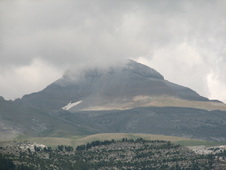 Today we embark upon the Paschal Triduum, which are the three days leading up to Easter. Holy Thursday is a feast day, a day of celebration. We are celebrating many things: the institution of the priesthood, the gift of Jesus to us in the Eucharist, and we are remembering that we are to serve as He served. But everything is really wrapped in the Eucharist, which is the source and summit of the sacraments. The Eucharist is no less than the Body, Blood, Soul, and Divinity of Jesus. That is, He leaves us Himself. When Jesus told the apostles that He would be with them always, and when at the end of Matthew's gospel we hear Him say, "I will be with you until the end of time" it is a reminder, among other things, that He is indeed present with us in so many ways, most notably through the gift of His Body and Blood in the Eucharist. In John's Gospel, during the Last Supper Jesus takes off his outer garment and begins to wash the feet of the apostles. All twelve have their feet washed. Yes, Judas, too. That should not shock us too much since all twelve betrayed, abandoned, and denied Him later that night, and He knew that was going to happen. Jesus did what was usually reserved for the lowest slave, the washing of the guests feet. This was a sign of welcome in those days, but Jesus is modeling how we are to serve. We are to treat everyone with this same welcoming spirit and with the same humility. I like to say that any authentic spirituality and authentic prayer should always lead us outward to service of others. Jesus washing the feet of the apostles is why I say this. It can be a healing act for others to receive a kindness from us that they may be sadly unaccustomed to receiving. We never know the brokenness or hurts of other people, so a kindness can be a great act of service. As St. Francis of Assisi said to his followers: "We have been called to heal wounds, to unite what has fallen apart, and to bring home those who have lost their way." Maybe we can invite someone who has not been to church in a long time to accompany us to celebrate Easter this year. Maybe that is the unity that He is calling us to spiritually. Maybe we know someone who feels like his or her life is falling apart or who feels lost spiritually. Coming somewhere where they can be fed with Word and Eucharist might be a way home. Maybe a simple kindness might be a way to healing and unity. Even in the newness of being in his position, Pope Francis has begun to model this so beautifully. He has eschewed any trappings of power and position, living as he has always lived, even if he is now pope. He has showed great welcome and warmth to everyone he meets, especially the most lowly. He has made personal contact with many, (much to the dismay to the Swiss Guard who are to watch over him for his safety). And he will celebrate Holy Thursday Mass with youthful offenders (many of whom are Muslim) in a prison, washing their feet and modeling the service Jesus taught the night of the Last Supper. Pope Francis is living the Eucharist; that is, he is being Christ to others, especially the outcasts. Is that not what the office of Pope is all about? His is Christ's representative on earth, the Vicar of Christ. I think many of us can learn so much from this man. It is the Eucharist which is the power which enables us to do any of this. Nothing is expected of us except our sincerity and our desire. The Eucharist fills all emptiness, all hungers, all thirsts. It is freely given by Jesus for us, to keep us ever close to His heart. He lays down His life freely to give us this great gift, which enables us to carry our cross also, to die the little deaths in our lives, and to hope to rise again. But that story is for Friday. Today let us begin to spend time reflecting on these great gifts and let us enter into the celebration tomorrow with joy and thanksgiving. May we ask have the grace to go the distance into the night that follows! I will meet you in the Eucharist. Peace. 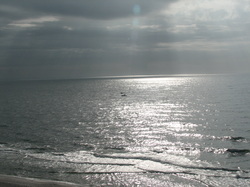 One of my all-time favorite movies is a relatively unknown film called The Island. It is a Russian film, (Ostrov) though it comes with English subtitles. The film is about a monk named Fr. Anatoly who is either a bit mad, or he is extremely holy. I think of him as a staretz, which in the Russian Orthodox tradition is an elder, renowned for his wisdom and holiness. The staretz often has great spiritual gifts such as prophecy, healing, and wisdom and they are great spiritual directors. (A good example of a staretz is Zossima in the novel The Brothers Karamozov by Dostoevsky.) However, Fr. Anatoly does not have overt leadership in the monastery on the remote island in Siberia where the film takes place. He is a monk with the lowliest position in the monastery by his own choice. There is an abbot, Fr. Filaret, who has much to learn from Anatoly, and to his credit, he does. The true spiritual leader of the community is in fact Fr. Anatoly. What makes the movie so compelling is the portrait we get of Fr. Anatoly, who though he does indeed have spiritual gifts, sees himself as most unworthy because of a great sin of cowardice he committed when he was a young man which cost his friend, Tikhon, his life. Throughout the film Anatoly is atoning for this great sin, but it is in the atoning that the source of his holiness lies. He has an intense love of the Lord and a deep sense of service to everyone around him, but he is also a source of consternation to many of the monks because they do not understand him or the riddles in which he seems to speak. Upon a careful viewing and re-viewing of this film the meaning of each of the riddles become more and more obvious. I find this film to be almost haunting in its beauty. One insight that sticks with me is that the one they seem to undervalue the most is the one with the greatest holiness. The one who is willing to be a bit of a holy fool, as Anatoly is in this film, is the one with the most profound message. Anatoly has extreme humilty, but he teaches each of the characters in the film to find the meaning behind his often bizarre behaviors on their own. Only we can do our own inner work. No one can do it for us. Even Anatoly has to do his own work when he is finally offered the chance to heal and to accept forgiveness once and for all of the sin for which he has atoned for so many years. God offers, but we have to respond. God never forces us to do anything, even heal. Another thing I love about this film is that it reminds us that there is great healing to be had in the act of forgiveness, whether it is our need to forgive others, or our need to beg forgiveness for our transgressions. Forgiveness is a very powerful form of love, maybe the most powerful of all acts of love. It is very difficult to do if we have been hurt badly. It is often more difficult if we are the ones who have caused hurt to someone else or to ourselves. That is, forgiving of ourselves is quite often the hardest act of love there is. Forgiveness is a process. We can not force ourselves to say we are sorry and truly mean it until we are really at that point. If we rush it, the words and actions will lack meaning and depth, so we will continue to be saddled with the emotions, the shame, guilt, hurt, etc., that was there in the first place. But if we allow ourselves the time and the process to truly forgive, it is a power that can be compared to nothing else in the world. It is the power to set free the captive, and often the captive is our very own self. It is the power of the greatest act of love of all time: the death and resurrection of Jesus. I do not want to spoil the film, but at the end Anatoly is indeed set free, and this is because he allows himself to be set free. You will have to see the film to see how this is done, and especially the closing event which shows he has the ultimate freedom as a result. But the truth remains: quite often we are harder on ourselves concerning past sins we have committed than anyone else. We do not feel worthy because we can not forgive ourselves or we can not let go of past hurts inflicted upon us. In reality, Christ died in order to forgive us of all our sins and to offer us that forgiveness over and over through the sacraments and prayer. The death and resurrection of the Lord truly gave us the greatest power of love there is: the power of setting people free through forgiveness. Maybe we need to lay down our grudges, our resentments, and our hurts at the foot of the Cross. Maybe we need to let go of our own bonds from the ways we do not forgive ourselves. It is in this letting go that we rise with Christ. And it is in this acceptance of the freedom that comes with forgiveness that we truly become the holy people we are meant to be. In doing so we will see greater beauty than we ever thought possible all around us. And we will see the great beauty within ourselves which was hidden behind the burdens we once carried. It is the beauty of love, which transfigures everything. May we be given the grace to see the areas in our life that are in need of healing! May we be given the gift strength in order to let go of hurts to which we may be clinging in order to be set free! May we set others free with our love! Let us meet in the heart of Christ in that sacrament of the greatest act of love there is: the Eucharist. Peace! 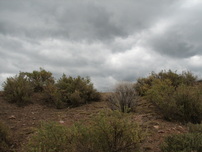 During Holy Week it is as if the clouds are gathering for the events of the Triduum. On Holy Thursday we will celebrate the institution of the Eucharist and the beginnings of the priesthood as Jesus gave both example of service and His own Body and Blood for us to have access to Him until the end of time. On Good Friday we will become immersed in the absence of Christ, having removed the Eucharist from the church at the end of the Thursday night Mass. We will hear the Passion read in its entirety that day, trying to fathom the betrayal and pain He felt. Then on Saturday the loneliness for Him will intensify as we wait for the Vigil in a sort of silent emptiness. It will be a long week, and it is tempting to want to think about Easter before we have completed this week. Even though Jesus knew He would resurrect, there was no focusing on Easter prematurely. He had to go through what we now call Holy Week before He could get there. He had to be totally immersed in each step of the way, or it would lessen the meaning and value of it, not just for Him, but for us, the recipients of the gift of love and hope which He gave. None of us can skip the lessons given by suffering in a situation to get to the freedom and new life. It simply does not work that way. Suffering teaches us much if we let it do so. But if we try to bypass it we are not only deluding ourselves, but we are missing the gift which comes at the end of the trial. The first readings on Monday through Wednesday, the last days of Lent, are from the Suffering Servant Songs in Isaiah. Each day they move us closer and closer to the reality of what the Messiah, Jesus, would go through centuries after they were written. And each day the Gospel readings move from the plot to kill Jesus by the authorities, to the Last Supper in which Peter is warned of his impending betrayal of Jesus by denying Him, to Judas' betrayal of Jesus for money. The key element in all of this is hope, or the lack of it. Both Peter and Judas struggled with hope in their response to their sin. In reflecting upon their betrayal of Jesus I thought of times when I was betrayed. In each of the situations that I recalled, what was worst was not remembrance of the lies told or deeds done, but the feeling of emptiness that first accompanied the realization that someone whom I trusted had betrayed me. I remembered the intense pain I felt at being misunderstood, falsely accused, or falsely represented by someone who I loved or trusted. Jesus had to feel that, too, only much more intensely since He was taking on all our sins. But then I remembered how in those situations I came to realize that no matter what it seemed like, I knew the truth of what really happened or of whom I really was. Yes, the Truth will set you free! The Lord's opinion of me is the one I value the most, and if in truth - (and I mean in real soul searching, not in denial of the possibility that I could be wrong) - I knew that I was not deserving of what was said or done, I then had the strength of hope in the promise of Christ. I could draw on His power so as to forgive the betrayer and I could move on with my life, stronger for the experience. It is also terrible to realize there are times when we have been the betrayer. To realize that we have inflicted that kind of hurt on someone else is agonizing. Imagine for a moment what it had to be like for Peter when he heard the cock crow and (in Luke's Gospel) then have Jesus look him directly in the eyes! The anguish he felt had to be so intense that it was like his own agony in the garden. In his case, he must have felt so loved, yet simultaneously so undeserving, that it hurt to try to accept that love at all. His emotions must have been very chaotic and his mind must have been tortured. But to Peter's credit, he accepted the forgiveness he hoped in and he began to understand to the core of his being just who Jesus was. He knew Jesus was Truth and Light; he knew Jesus was the true Messiah and only Son of God who alone could take away the sins of the world....and his sins, too. And he knew that not only was he forgiven, but that if he continued to cling to the Lord in everything, he could in fact be who Jesus knew he was: a leader. Peter had hope in the promises of Christ. 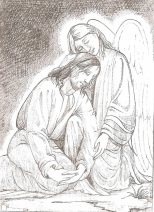 In contrast to Peter, Judas did not believe in the promise of hope and forgiveness given by Jesus. That is why his life ended in death while Peter went on to live a life of service filled with the joy of knowing the Lord. Both men sinned terribly: both betrayed a dear friend who was Messiah and Lord. Both had a measure of selfish interest that led them to their sin. Peter was fearful of losing his life if he was found to be associated with Jesus. His cowardice and selfishness led him to deny with vehement curses even knowing the man. Judas' selfishness was in wanting to accomplish his own will. That is, he either wanted to get rich from turning Jesus in as asserted in one gospel, or he was trying to force Jesus to reveal Himself as Messiah in a complete misunderstanding of who Jesus was and why He came. Either way, Judas betrayed Jesus with a kiss, took the money, and ran. The worst tragedy for Judas, however, was that when he began to regret what he had done, instead of trusting in the message of forgiveness taught by Jesus, he lost all hope. He did not believe that his sin could ever be forgiven and so he despaired and hung himself. Without hope he was crushed beyond repair. He let go of hope and chose death over life. Peter's sin was just as ghastly, but in his sorrow, he remembered the words of Jesus and he trusted them. That is, he had hope in the forgiving love of Jesus and accepted it. That choice led him to life. I would go so far as to say it led him to new life. He accepted his responsibility, grieved for his sin, let hope change his sin to strength and went on to become the first leader of the young Christian church. I have come to believe that our worst sin or greatest failing, once forgiven, can be the source of our greatest strength if we let it be our teacher. No matter how bad the sin was, or how badly we may think of ourselves as a result, we have the love of our Lord who can forgive anything, even the betrayal of His closest friend. Every time we sin we are Peter to a certain extent. We betray Jesus over and over, maybe in small ways, but it is still a betrayal of the love we have. Like Peter we do not mean it, but it happens anyway. It is part of our human condition. But what we learn from it can change us, just as it changed Peter. It can teach us to love more deeply, it can teach us greater compassion, it can teach us humility, and it can teach us not to judge others since we have walked in their shoes, so to speak. Let us spend some time this week reflecting on the virtue of hope. Let us remember that hope has great power. We receive hope along with faith and love at baptism. These are incredibly important, powerful gifts. We often use our faith and our love, but we sometimes neglect hope. Let us reclaim the great virtue, the gift of hope, realizing that it has the power to help us overcome anything. We can, like Peter, hope in the promise of the Lord that no matter what we have done, or what happens to us, we can rise to new life with Him. May we be healed of the wounds due to any betrayal we have experienced! May we be forgiven of any betrayal we have committed! May we trust in the hope given us by the Lord that not only are we loved greatly despite our failings, but we are invited to rise to new life with Him! Let us remain on vigil with the Lord during this Holy Week. Let us continue to meet in the Heart of the Lord, filled with the light of Hope. Peace! The top photo is mine, taken in New Mexico last year. The pencil drawing was done by Rev. William Hart McNichols for the book The Fifteen Mysteries by Basil Pennington. It is Jesus being comforted by an angel during the agony in the garden. 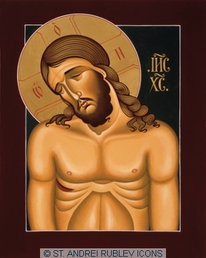 Holy Week is a time when we are acutely aware of the lengths God goes to in order to save His people. Midway through Holy Week, Lent ends and the Triduum begins, which is the holiest time of year for Christians. This year Lent was punctuated by the election a new pope, Pope Francis, the former Cardinal Jorge Mario Bergoglio from Buenos Aires, Argentina. Among the many pictures and the scores of stories we have been hearing about the new pope was news of his choice of a motto for his pontificate, "Miserando atque eligendo." This has been translated "lowly, yet chosen" and is a quote of a homily given by Venerable Bede* which originally read: "...because he saw him through the eyes of mercy and chose him." Venerable Bede was referring to the gospel story of Jesus choosing Matthew as a follower. Obviously, this pope sees himself as having been chosen by God for his ministry, but yet, he sees himself as lowly. Given that the office of the pope is the highest in the church, this seems like a huge departure. But it really is not. Pope Francis clearly sees himself as a disciple of Christ, who came to serve, not be served. This is what Jesus taught the apostles to do at the Last Supper. St. Peter came to understand this, and so far this pope seems to have humble service first and foremost in his mind. Jesus was indeed lowly in His humanness, and yet He is the Son of God, greater than any other human could ever be. The paradox of who Jesus is and how He chose to become lowly and die a humiliating death is nothing short of astounding. The readings for this Sunday, which is Passion Sunday, are all about who Jesus is and why He came into our world. The first reading, Isaiah 50, and the 22nd Psalm (which Jesus quoted from the cross) were prophesies about what the Suffering Servant Messiah was to be: He would willingly suffer abuse, taunts, and humiliation for His people. He would choose to serve His people, but would be ultimately rejected by them. But the most powerful of the readings (and which even explains the Gospel), is the second reading, a most beautiful hymn written in the letter of Paul to the Philippians. In it Paul explains that Jesus was indeed God, but He chose lowliness over royalty and pageantry. That is, He could have come to earth on a cloud, crown on His head and scepter in hand, taught us His message, explained what we had to do, and then gone back to Heaven. Or he could have revealed His divinity when He was arrested and told everyone exactly what was what, and then arisen back to Heaven in glory for all to witness. Instead, He entered our human condition as a vulnerable baby, stayed 30 years in obscurity, and then after serving and teaching, He let Himself be arrested and tortured and killed. "... He humbled Himself, becoming obedient to the point of death, even death on a cross." That God would enter into our world as a lowly human is amazing enough, but that He allowed Himself to be abused and killed after working so hard to help us understand how greatly we are loved, is beyond comprehension. That is why "at the name of Jesus every knee should bend of those in heaven and on earth and under the earth!" When the time came, Jesus rode triumphantly into Jerusalem; He left Jerusalem, so to speak, on a cross. He allowed Himself to be given acclaim, maybe to bring attention to the starkness of what was to come. But I think it was so we could see the greatness of His love for us. He entered the city as the center of attention, with shouts of "Hosanna” but only a little later the shouts turned to "Crucify Him" while all His friends betrayed Him, running off and leaving Him to die alone. The hardest part for us to swallow may be that He saw it all coming and still went into the city to let it be done to Him on our behalf. That is to say, He chose to die as He did. He chose to come into the world for this purpose alone! 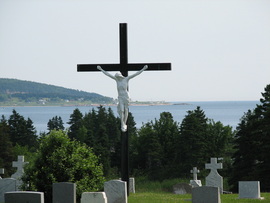 It is important to recognize that all of us are seen by God through the eyes of mercy, and yet are also chosen. We are chosen to be His. It is Mercy who came to earth as a man, Jesus, and it was Mercy who was nailed on the cross and who died for us. It is Mercy who continues to choose us. It is Mercy who empowers us with grace. It is Mercy who accompanies us in our sufferings, and it is Mercy who forgives us when we sin over and over. It is also Mercy who continues to guide us to Heaven. There is no greater mercy than that, since none of us deserves it. But as I say over and over, our true identity is that of the loved sinner. It is only through the mercy with which Jesus Himself lived, died, and rose that we can attain Heaven. We do not deserve it any more than we deserved the Son of God to leave the glory of Heaven to come among us and to get very messy in order to save us. All that we have is gift, and the gift is totally beyond the magnitude of our ability to earn it or even think we deserve it. He chose us and He chose to give us the gift of His love and mercy. Luckily we do not have to earn this gift of love and mercy, as gifts are never earned, they are given. But we could never repay this one even if we wanted to. The only thing we can give back to Jesus is acceptance of the gift, which means we offer our lives back to Him. All we can give, in other words, is ourselves. We can love Him back by honoring Him through our own love. That means loving those who are difficult to love, be they strangers or family. It means offering our work, as paltry as we may think it is. It means offering our prayer, our intentions, our actions, all that we are, back to Him, not worrying about our lack of perfection, but giving all that we can give of our heart to Him. He gave the perfect sacrifice in place of our imperfect one when He went through His Passion and death, so He will continue to accept our imperfect offerings with mercy and love because that is who He was, is, and always will be. I think it is no coincidence that we have a new pope at this point in Lent and that he reminds us of the beauty of humility. Humility is the attribute that opens the door to love and mercy. Without it, there cannot be the greatness of love that enables one to have solidarity with another human being and to truly be a man or woman of visible love. Everyone has noticed the humility of Pope Francis, let us be inspired by it: let us act the way he does, as a servant of the Lord. May his humility be contagious, especially to those in power! He also seems to be a man with a quick smile and a sense of humor, which is another attribute of humble people. But do not be fooled: he also knows what it is to suffer because he has seen it in the people he has served and he has often suffered with them. Suffering breaks open the heart in order for love to enter. Humility comes from understanding the nature of the gift of Love we have all been given, which comes through the Son of God's own suffering in and through His people. Let us offer our full attention to Jesus during this upcoming Holy Week. May we be amazed at the magnitude of His self-offering on our behalf! May we be humbled by the depth of His Love and Mercy as He goes through the Last Supper, the agony in the garden, and the dying on the Cross this week! May we be inspired by His humility to ask for this grace for ourselves, but also for the courage to accept it! Let us continue to pray for each other as we meet in the Heart of the Lord of Extreme Humility and Mercy during this Holy Week. Peace! *Venerable Bede was a Benedictine monk, priest, and historian who lived from 672 or 673 to 735 in Northumbria, England. He was the first English church historian and is a Doctor of the Church. His most famous work is Historia ecclesiastica gentis Anglorum (The Ecclesiastical History of the English People). The icon at the top is Jesus Christ Extreme Humility written by Rev. William Hart McNichols. You can get copies of it or more information about it at http://www.standreirublevicons.com/gallery.php?action=viewPicture&id=93 or at http://fineartamerica.com/featured/jesus-christ-extreme-humility-william-hart-mcnichols.html The picture in the middle of the post is one of my own photos. It was taken in Nova Scotia, Canada a few years ago. 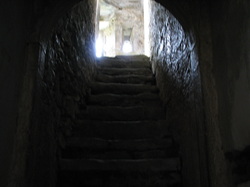 A number of years ago my husband and I took a trip to Ireland. We had a wonderful time driving all over the country, including a trip to a lead and silver mine in County Galway. There were not that many visitors that day, so we were treated to a private tour inside the mines. Donning our hardhats we went down into the earth and saw the veins of quartz, silver pyrite, lead, and other materials. It was fascinating, but I do remember feeling just a bit more than glad when we resurfaced after spending 20 minutes or so inside what felt like the bowels of the earth. (It was not really all that far down, I am sure!) I was not at all frightened, but I do remember feeling quite happy to see the sun once again when we emerged and to know we were out of the dark beneath the surface. This week the readings for the 5th Sunday of Lent (Year A readings) are about coming out of our graves and coming into the light. The first reading from the prophet Ezekiel is a message from God to the people saying "I will open your graves and have you rise from them." He says, "I will put my spirit in you that you may live..." God wants us to have life. He wants us to be in the light, filled with the graces He desires to lavish upon us. The reading from the letter of Paul to the Romans also talks about God desiring to give us life through the Spirit dwelling in us. God is so consistent in His message and in His promises! In the Gospel we hear that Lazarus was dead for four days before Jesus brought him back to life. We also hear that Jesus deliberately waited when He knew Lazarus was dying in order to bring glory to the Father. Therefore Lazarus was in the dark place of the dead, called Sheol, long enough to have had a longing for the light, though we can only speculate as to what it may have been like for him. 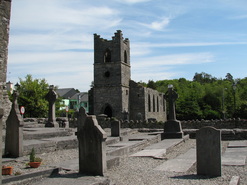 The key to all of these readings is in the Psalm antiphon: "With the Lord there is mercy and fullness of redemption." (Psalm 130) The Lord wants us to have life, which means He wants us to be filled with His love and with the graces that bring us joy and fullness of relationship with Him. But He knows that sin is what keeps us from the fullness of life in Him. He knows that our own sinfulness and weakness keeps us from being who He made us to be, that is, our true self. But notice that what He wants to give us the most is mercy and the fullness of redemption. He does not want to give us condemnation. He wants to give us mercy and all the redemption we need to overcome our shortcomings and failings. It is that mercy that helps us rise out of the dark place of sin that we continually fall into. During Lent we are encouraged to go to the Sacrament of Reconciliation. This is a sacrament that we should go to as often as we can, not just because we are sinners, but because we are loved sinners! The Sacrament is a gift from God and it is where we find mercy and fullness of redemption, not judgment and condemnation. I always say that better we avail ourselves of God's mercy and redemption now, then get to the day of our judgment at the end of our lives and find out that we chose the judgment and condemnation because we were too fearful to have chosen the mercy! An analogy I like to use is the following: Imagine you dropped a penny on the floor every day. What's a penny these days, eh? But after a while not only is the floor getting covered with pennies so that you are slipping and sliding, but it is starting to add up. Then one day you discover that all those pennies have created a wall such that you can no longer see what is on the other side. The pennies are like our sins. Even small venial sins add up to bad habits. They can pile up, like the wall of pennies. They seem like “no big deal” and so we do not pay attention until one day we have walled God out. The Sacrament is when we choose to “own up” to what we have done or have failed to do, and we begin to willingly take down that wall. However, we need help to do it, so we call upon God to help us. He helps us to tear down the wall as we ask His forgiveness and grace to strengthen us. But the best part is when the wall is down: He is on the other side, not with a wagging finger lecturing us for our stupidity and weakness. Rather, He has His arms outstretched while saying, "I have missed you! I am so glad you are back!" That is what the Sacrament of Reconciliation is like for each of us. He only wants what is between us to be taken down. He wants us out of the darkness of sin and into the light of His life. Habitual sin brings death and decay to our relationship. Reconciliation brings light and life. 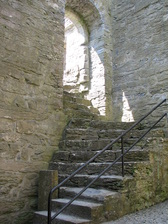 When Lazarus died Jesus wanted to teach us by letting the event take place. When He went to Bethany to go to Lazarus’ tomb, Jesus was first greeted by Martha, then Mary, Lazarus' sisters. Both the women said the same thing, one after the other: "If you had been here, he would not have died." But they were not scolding Jesus. Instead they were making a faith statement. It was like they were saying: “We know who you are and what you can do.” They accepted the reality of who He was and therefore trusted Him. Jesus, knowing He was about to raise Lazarus, still wept! Being compassion, He felt the sorrow of those around Him and joined them in their pain. He did not simply observe their pain: He felt it. This should not surprise us, since He was soon to take on the sin of the world and the pain it causes, so why would He not take it on here, also? Jesus thanked His Father in advance of the miracle, and then commanded, "Lazarus, come out!" Lazarus was resuscitated; he was not resurrected. Though this was a preview of sorts of what was to come, no one resurrected before the Lord Himself did it. And the rest of us, including Lazarus, have to wait until the Second Coming to have resurrection. But nonetheless, Lazarus came out of the tomb, alive again. He was in the darkness of sin and death, but now he had new life. In a radical way Baptism will do this for the Catechumens in a few weeks; Confirmation will give new life to both the Catechumens and Candidates, and the Eucharist will give new life for us all. We are anticipating that new life, and to do so, we need to begin the process now. That is why we need to go to the Sacrament of Reconciliation so that we can begin to let the Spirit lead us from the darkness of sin into the new life of Easter. Maybe it is time we let the Lord command us to come out of the tombs of whatever is dying of neglect within us or what may be leading us down the road to spiritual death. No one likes to talk about their own sin and no one likes to admit that they are on the wrong path, but truth be told, we are all sinners and we are all in need of liberation from our tendencies. But we must always remember that we are loved sinners and that God knows we are imperfect. In fact, that is why He sent His Son: to save us from ourselves. He is already doing the work of redemption in our lives, so maybe we need to let Him say to us: “Come out!” I don't know about you, but I want to respond to His call and go from the darkness into the light! May we have the courage to face that which is holding us back from coming into the light! May we hear our names called as the Lord commands us to come out of all that keeps us from Him! May we accept the grace to indeed come out of the darkness! May we have the faith in the promise of God for mercy and fullness of redemption! And may we have the increase of love that we need to share that mercy with others as we live the life of true disciples! Let us continue to meet in the Heart of our Lord who alone can offer mercy and fullness of redemption! Peace! 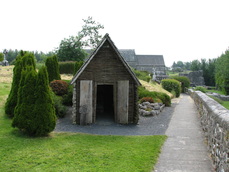 I took all the photos in various locations in Ireland in 2006. 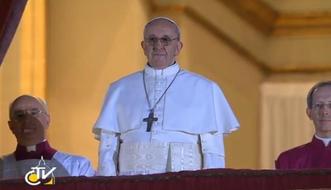 We are blessed to have the Argentinian, formerly known as Jorge Cardinal Bergoglio as Pope Francis, our new pope! To begin with prayer and to ask the people to bless him before he gave his blessing is amazing. He is a humble man, obviously. The Holy Spirit has indeed answered our prayers. Let us pray for him as he takes on this unbelievably difficult office at this time in our history. 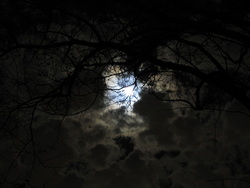 From the time I was in fourth grade until the present, I have worn glasses of some type. When I was first starting a musical instrument my teacher realized I was squinting a lot, so he called my mother and told her I needed to have my eyes checked. It turned out I was really badly astigmatic and near-sighted. Henceforth, I had the proverbial “coke-bottle” glasses. Worse still, every year I would need a new prescription because my eyes seemed to be ever changing. But in the end, however, I loved getting new glasses, or eventually contacts, because when I first put them on the world suddenly was just a bit clearer. I would discover that I had been missing the sharpness and clarity which I thought I had, but truly did not. Years later I was diagnosed with cataracts, (at a young age, I might add). When I finally had the surgery I got a wonderful surprise: it was like that wonderful scene in the Wizard of Oz when Dorothy emerged from the house after it fell from the sky into the Land of Oz. The film went from black and white to glorious color! It seemed like that for me also. I could see things I had never seen before without the aid of glasses. I was like a small child amazed at everything. It was incredible to see with such clarity and vividness without needing correction. The gospel reading for this Sunday, (for those who are coming into the Church at Easter), is the story of the man born blind. It is interesting that at the beginning of the story the disciples are almost as blind as the man who is sitting by the side of the road. They ask if the man sinned or his parents, that he was born blind. That was a common misconception in those days: anyone who was infirm in any way was thought to be that way due to sin. They literally thought God cursed them for being sinful; therefore they looked upon the sick with disdain rather than with compassion. Jesus was not only trying to help the man, but to combat that superstition. He explained that no one sinned, but rather God was going to be made visible through this man. In other words, Jesus, who is the Light of the World, was going to overcome the darkness of unbelief and misconception. Jesus spat on the ground and made mud and put it on the man's eyes. He hearkened back to the Genesis story when God made the first man (and subsequently, woman) out of clay. The blind man was being made whole, and in the end of this encounter it was as if he was re-born. Those who are coming into the Church at Easter will be re-born through the waters of Baptism and empowered with the graces of Confirmation. This gospel has many layers of meaning for them, and for us, too, as we "remember" our Baptism. Jesus uses His spit, creates mud, and then tells the man to wash in the pool called Siloam, which means "Sent." The man is not the same after he rose out of that water, no more than a catechumen is the same after he or she comes out of the waters of Baptism, or the candidate after he or she receives Confirmation. Like the man, they die to sin and rise to new life. They have new sight. That is, they are no longer blind to the grace of God, and they have new life in Christ, just as the man born blind had new life in Christ. In addition, the new Christians are sent forth, just as the rest of us are, with a new mission to live the Christian life, to help build the Kingdom of God. With the new clarity of the graces received they are empowered to do so. The former blind man now had the eyes of faith, unlike the Pharisees who refused to believe. Later, the Pharisees heard Jesus state that He came “so that those who do not see might see, and those who do see might become blind." It obviously struck close to home because the Pharisees then asked, "Surely we are not also blind, are we?" For the reader, it is clear that the Pharisees are indeed blind, not because they cannot see, but because they refuse to see. They would rather stay stuck in their own sin of pride and arrogance; they would rather stay comfortable in their self-made world, then to be freed from the blindness that held them prisoner. For them, it was easier to stay blind! 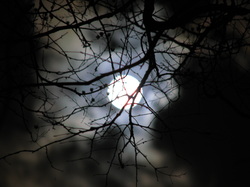 Sometimes it takes a bit of work to become whole or free. The man in the story had to do something distasteful. Sitting on the side of the road begging was distasteful, but having someone rub mud made out of spit on one's eyes is also distasteful. Having to wash in a pool with everyone watching is more than distasteful; it is embarrassing. But he was open and willing to do what Jesus asked him to do because he wanted to be freed. In the end, he was grateful for the transformation through this encounter, just as any encounter with the living God in a sacrament transforms us. He accepted the fullness of new sight: he believed. What do we have to do to be freed from what holds us back from seeing with clarity? It seems to me, all we have to do is ask and then believe that Jesus will help us with whatever our short sightedness may be. But we may have to do something that seems distasteful or is out of our comfort zone. We may have to forgive, or ask forgiveness; we may have to admit a behavior to God and ourselves and ask for help in combating it. We will have to do the work of letting grace transform us. This story exemplifies the fact that while Jesus has the power to say, “Be healed!” and it is done, often we have to work at something for it to take fullest effect. It means more to us in the end when we have worked with God for freedom. We value it more, but it also shows that we sincerely wanted to change our hearts not just to be free, but to be free to love Him more! In other words, our desire for healing cannot be self-centered. It needs to be so we can know, love, and serve Him better. That is the stance of a true disciple. The challenge is to accept the gift offered us to be freed of whatever holds us back from God, small or large. Will we accept the gift of new sight and new freedom? Or will we be like the Pharisees and refuse to see? Will we refuse to admit to what keeps us from holiness and therefore refuse the grace we need to be freed? Will we be afraid to do the work, or will we let the Lord heal us, even if it means letting go of or changing a behavior? The choice is ours, but it is clear that the Lord deeply desires to heal us and set us free. For many of us the issues are interior ones. Maybe it is selfishness, or impatience, or lack of trust in God, or lack of forgiveness directed at ourselves or another person. Maybe it is an attitude toward another person or a group of people we need to let go of or let be stretched. Maybe it is an unwillingness to spend time in prayer. Whatever it is, God loves us so much that He wants to free us. He does not want to judge us; He wants to love us. The areas of un-freedom within us keep us from receiving that love and therefore from being able to share it with others as fully as we might. So let us enter into this fourth week of Lent asking the Lord to free us anew. Let us ask for our blindness to be healed so that we may see Him all around us, in others, and in our own heart. Let us remember the Pool of Living Water of our own baptismal promises which not only freed us from sin, but empowered us as disciples. May we be healed of whatever keeps us from wanting to grow in freedom and love so we may accept the gifts of the Spirit offered to us! May we be able to see with new clarity the brightness of His love for us and His presence in our world! And may we be a beacon of that light of love towards those around us! Let us continue to meet in the Heart of the Lord who is the Light of the World and the Living Water. Peace! 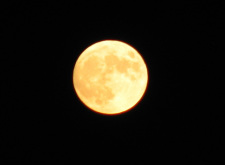 I took all three photos. The progression is to symbolize the increasing clarity of the gift of sight given to us as we become freer and freer in our spiritual lives. 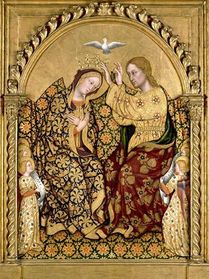 Recently I have been noticing a strange phenomenon at one of the major intersections near where I live. In the early evening there are so many birds gathered together in that one spot, it seems like something out of Alfred Hitchcock’s movie, The Birds! The birds are all over the power lines in every direction and they are in every tree in the vicinity. The thousands of birds all chirping at once make for a cacophonous din rather than for beautiful song. And truth be told, I have feared for my just-washed vehicle with all those birds aloft or on wires over me when I am sitting at the light waiting hopefully for it to change. I wondered what on earth all those birds could be doing there: on each corner is a shopping center and there is no source of food I can discern. I have even wondered how they manage to stay on the power lines without getting electrocuted. It really is quite a mystery to me. Short of there being some sort of bird convention happening in a world I know not of, this phenomenon is a strange mystery. There is something about this spot that makes it attractive to them because thousands alight on whatever they can find in this avian mob scene. Actually, the spot is attractive to the bird who must be in “leadership”, the one who the many birds follow, (maybe some sort of “alpha” bird), and until that bird decides it is time to re-locate, they stay there. It strikes me (metaphorically) that the flocks are disciples of the lead bird. And where that bird goes, they follow. In our faith lives we, too, follow a leader, who is our Lord Jesus Christ. Unlike birds who may only be following by instinct or because they are hungry or thirsty, we make rational choices. Don't we? Yes, we do; but like the birds we also follow through a "spiritual instinct", if you will, which is called faith. We receive this gift at our baptism: it is freely given and we freely accept it, so we do make a choice. But because it is a grace, it often empowers us when we are searching for understanding of something beyond us or if we are searching for God in a situation. It allows us to hear the Word as spoken by Jesus and written in the Gospels and it inspires us to follow, knowing He is the true Son of God. It allows us to learn how to discern the movements of the Spirit who leads us toward God. Faith also helps us to learn how to notice God's presence all around us. The spiritual life is about learning how to notice the movements of God both interiorly and exteriorly. It is about attentiveness, which is a choice we make in response to our loving God. Our lives are filled with all sorts of signs of the presence of God which we often miss while hurriedly going about the busyness of our day to day lives. We can learn how to be more attentive to these signs through prayer. Through prayer, we learn how He works in our lives; we learn what is holding us back from being our true selves and subsequently what He is offering to lead us to freedom; and we learn what His dreams are for us, (interior noticing). God loves us first and invites us into that love. Our response of love in return is what I call prayer. We desire to share ourselves with the Beloved who has first shared Himself with us. His love so moves us that we begin to let it shape and mold us, to melt the hard places within, and to inspire us to share it with others. If we let love transform us little by little in prayer, it can only move us outward in loving actions. Love moves us to act, to give, to bring healing and hope because love cannot be contained. It has to overflow. In prayer, we allow that transformation, but in the process we learn how to notice God’s presence all around us, (exterior noticing). Our time of prayer may not feel like anything is happening, but it opens the door to seeing the world transformed because we begin to see Him everywhere. 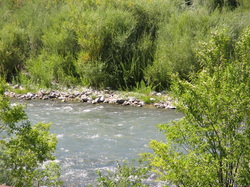 Like the birds in my example, we, too, are hungry. As disciples, we hunger and thirst for all sorts of things, but especially for God. We want to follow because we trust in His message. In the Gospel for this Sunday we hear about a Samaritan woman who met Jesus at a well in her town as He and the disciples were passing through. Samaritans and Jews had a long history of disdain toward one another. Therefore when Jesus began speaking to the woman, she was shocked that He, a Jew, would speak to her, a Samaritan woman. He already knew all about her. He knew she was considered a fallen woman, since she had had five husbands and the man she was living with was not her husband. She was at the well at midday, which was when no one else would be around, probably because of her sense of shame due to her lifestyle. Yet Jesus not only engaged her in dialogue, but He helped her to see that He was attentive to her in order to offer her the Living Water that only He could give. He reached out in love and she responded. She was very thirsty, and He gave her to drink of the well of His love. The woman was so transformed by the love she received that she ran back to town, leaving her most valuable possession, the water jar, behind. It seems that she truly understood that nothing of this earth is as important as the love of Jesus who alone can give us the living water of eternal life. As evidence of her transformation, she was no longer ashamed of who she was or of what the other people thought of her. She ran through the town telling people to come and see the man who told her everything about herself, who she identified by wondering if he could possibly be the Christ. In that transformation, she became a true disciple, because her first response was not to keep this treasure to herself and hoard what she had received. Rather, she ran to share it with people who probably were not considered her friends up until that moment. A true disciple proclaims the gospel, and being filled by the love which Jesus gives, cannot but share it with others. When she chose to drink of the water He offered, she became a true believer. Like the Samaritan woman and her neighbors, (and maybe like the flocking birds), we are hungry and thirsty for the Lord. Jesus still sits at the well waiting for each of us to show up so that He can give us the Living Water of eternal life which only He can give. Nothing less will ever satisfy us. But we need to be attentive in order to see Him present at the well. That is, He is present to us every day, but if we are in such a hurry that we do not notice Him at the well, then we will pass Him by without so much as a nod of our head. If we learn to recognize Him by allowing the Spirit to open our eyes through the practice of prayer, we can drink deeply of His love every moment of every day. And the more we drink, the more we share with those who are searching. Let us be like the Samaritan woman who allowed herself to engage in conversation with Jesus. Let us allow our prayer time to transform us. Let us realize that even if we do not feel His presence He is indeed there, offering us His love on a very deep level. Let us become selfless, like the woman, turning to prayer in order to center on God, and then turning to others in order to share the wealth of His message and His love. If we spend the time, He will help us to learn to see Him everywhere with the eyes of our hearts and to trust that in those times when we cannot see Him, He is indeed present. May we have the desire to pray and to let our prayer transform us into true disciples! May we allow the Spirit to guide us as we live our faith, hope, and love! May we learn to be attentive, seeing the presence of God all around us! And may we find our thirst for love, belonging, and service, (that is, our longing for the Kingdom of God), satisfied by the Living Water only Jesus Christ can give! Let us continue to meet at the well within the Heart of Jesus where we drink deeply of His love! Peace! *All photos are mine. The pelican above is a Christian symbol of selfless love. This one seemed to be attentively watching the fisherman in order to acquire some of their fish to eat. I presume she was also wanting some of their catch in order to feed her offspring. The second photo is of the Rio Grande River in New Mexico. It reminds me of the living water Jesus spoke of in that there is much greenery and life near the water's edge. 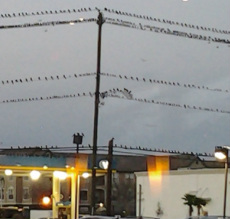 Here are two photos I took after I posted this blog entry. This only gives a small idea of how many birds there are in this area. They clearly spanned a quarter mile in each direction. The sight is almost unbelievable...and imagine the noise! (By the way, I shot these with my phone camera from inside a restaurant, so that is why there are reflections of light which seem to be in the sky.) |
Heart Speaks to Heart
|
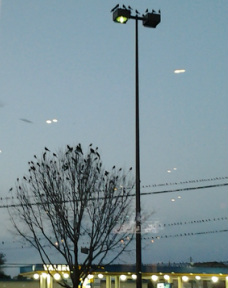

 RSS Feed
RSS Feed

